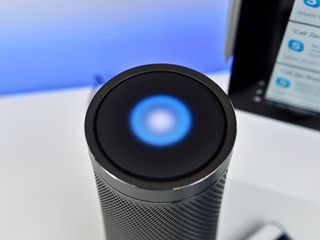Microsoft patent could help third-party Cortana skills feel like native experiences
Say goodbye (maybe) to awkward interactions.

Digital assistants like Cortana, Alexa, and Google Assistant can be incredibly useful tools, particularly when myriad third-party skills are added to their repertoire. However, interacting with those same third-party skills can sometimes feel a little stilted, depending on how they are implemented within the system. With a recently published patent (via Windows United), Microsoft is exploring ways to make things a little less awkward by envisioning a system whereby third-party skills are presented as if they're native experiences.
Filed in October and published this week, the patent, titled "Digital Assistant Extensibility to Third Party Applications," builds off of a patent originally filed in 2015. In it, Microsoft describes a method for giving third-party skills access to more general digital assistant resources to give them more information to draw upon. From the description:
A digital assistant includes an extensibility client that interfaces with application extensions that are built by third-party developers so that various aspects of application user experiences, content, or features may be integrated into the digital assistant and rendered as native digital assistant experiences. Application extensions can use a variety of services provided from cloud-based and/or local sources such as language/vocabulary, user preferences, and context services that add intelligence and contextual relevance while enabling the extensions to plug in and operate seamlessly within the digital assistant context. Application extensions may also access and utilize general digital assistant functions, data structures, and libraries exposed by the services and implement application domain-specific context and behaviors using the programming features captured in the extension. Such extensibility to third party applications can broaden the scope of the database of information that the digital assistant may use to answer questions and perform actions for the user.
The result of such a system would potentially improve the performance of whatever device people are interacting with, resulting in more accurate and timely answers. More importantly, Microsoft envisions this as a way to improve the quality of the assistant's answers, ultimately reducing the number of steps required to get the information users are looking for.
Extensibility, Microsoft says, could also reduce the computing resources required to get an answer, potentially cutting down on network bandwidth and improving battery life.
As Cortana has lost ground to Google Assistant and Amazon Alexa in the digital assistant space, much has been made of its future. But while Microsoft might not have any major plans for deploying Cortana across a robust lineup of dedicated smart speakers and displays, the company continues to spot other areas for growth. Recently, for example, Microsoft CEO Satya Nadella commented that the company is looking at Cortana more as a complement to, not competition for, Alexa and Google Assistant. Cortana is also being positioned as the AI backbone across Microsoft's own services.
Get the Windows Central Newsletter
All the latest news, reviews, and guides for Windows and Xbox diehards.
Dan Thorp-Lancaster is the former Editor-in-Chief of Windows Central. He began working with Windows Central, Android Central, and iMore as a news writer in 2014 and is obsessed with tech of all sorts. You can follow Dan on Twitter @DthorpL and Instagram @heyitsdtl.

